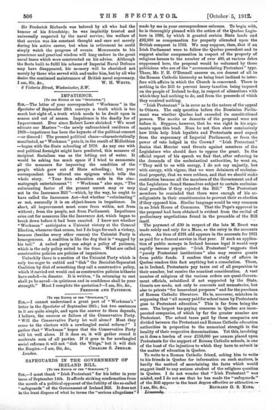SAFEGUARDS IN THE GOVERNMENT OF IRELAND BILL.
[To THE EDITOR OP THE " SPECTATOR."]
must thank " Irish Protestant" for his letter in your issue of September 14th. It affords striking confirmation from the month of a political opponent of the futility of the so-called " safeguards " of the Government of Ireland Bill. It does not in the least dispose of what be terms the "serious allegations" made by me in your correspondence columns. To begin with, he is thoroughly pleased with the action of the Quebec Legis- ture in 1888, by which it granted certain State lands and £92,000 as compensation for property alienated upon the British conquest in 1763. We may suppose, then, that if an Irish Parliament were to follow the Quebec precedent and to suggest similar compensation in respect of the property of religious houses to the number of over 480, at various dates suppressed here, the proposal would be welcomed by those politicians who are of the "accommodating Protestant" type. These, Mr. F. H. O'Donnell assures us, are dearest of all to the Roman Catholic hierarchy as being least inclined to inter- fere with affairs in which the Church is concerned. There is nothing in the Bill to prevent heavy taxation being imposed on the people of Ireland to-day, in respect of alienations with which they had nothing to do, and from the proceeds of which they received nothing.
"Irish Protestant" is in error as to the nature of the appeal to Ottawa. The only question before the Dominion Parlia- ment was whether Quebec had exceeded its constitutional powers. The merits or demerits of the proposal were not before it. Suppose, however, that he was right in his argu- ments upon this head. Does he not then show conclusively how little help Irish loyalists and Protestants need expect from the supremacy of Imperial Parliament, or from the power of veto lodged in the Crown ? " Irish Protestant " denies that Mercier used threats against members of the Legislature who should dare to oppose the grant. In the official report of his speech we find that, after referring to the demands of the ecclesiastical authorities, he went on, " They said to us with energy, I do not say unjustly, but with energy, with vigour, that we were detainers of ecclesias- tical property, that we were robbers, and that we should make restitution because all the members of the Government and of the Legislature found themselves subject to certain ecclesias- tical penalties if they rejected the Bill." The Protestant members he reminded that there were enough of his cc- religionists in their constituencies to prevent their re-election if they opposed him. Similar language would be very common in an Irish House of Commons. That the Pope's approval to the proposal had been obtained is evident from the recital of preliminary negotiations found in the preamble of the Bill itself.
The payment of £30 in respect of the late M. Brost was made solely and only for a Mass, as the entry in the accounts shows. An item of £191 odd appears in the accounts for 1911 as paid for a funeral service in that year. If such an applica- tion of public moneys in Ireland became legal it would very rapidly become popular. "Irish Protestant" suggests that " purely Protestant institutions " also may receive grants from public funds. I confess that a study of affairs in Quebec renders this fact anything but a consolation. There, as in Ireland, Protestants pay taxes out of all proportion to their number, but receive the scantiest consideration. A vast number of religious of the various orders are quasi-Govern- ment officials, subsidized if not supported by the State. Grants are made, not only to convents and monasteries, but also to priests "for benevolent purposes" and for the purchase of Roman Catholic literature. He is, moreover, mistaken in supposing that " all money paid for school taxes by Protestants goes to Protestant education." This is far from being the case. The largest tax-paying concerns in Quebec are incor- porated companies, of which by far the greater number are Protestant. The school taxes paid by these companies are divided between the Protestant and Roman Catholic education authorities in proportion to the numerical strength in the locality of their respective denominations. Yet this, involving - as it does a burden of over £150,000 per annum placed upon Protestants for the support of Roman Catholic schools, is one of the least of the injustices to which they have to submit in the matter of education in Quebec.
To write to a Roman Catholic friend, asking him to write to his friends in Quebec for information on such matters, is hardly the method of ascertaining the facts which would suggest itself to any serious student of the religious question in Quebec. I do not wonder that " Irish Protestant " was misled, and I do not see that he has made the "safeguards" of the Bill appear in the least degree effective or attractive.--.


































































 Previous page
Previous page